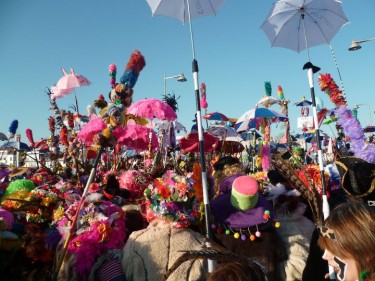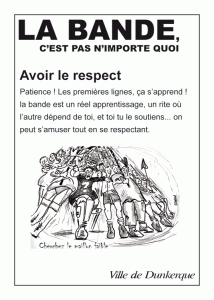A video featuring a group of masked Carnival revelers in Dunkirk, France chanting “Les touristes on n'aime pas ça” (“We don't like tourists”) has some ruing the flood of visitors who come year after year unprepared for the festival's madness.
Dunkirk hosts one of the largest Carnival celebrations [fr with en subtitles] in Europe in terms of the number of participants and duration (three full months). The tourism office records about 1,000 hotel guests during the liveliest part of the celebration, the three days known as les Trois Joyeuses, while other tourists, many of whom are introduced to Dunkirk's Carnival by locals and return every year for the celebration, stay with friends.

Carnival-goers at the Bande de Dunkerque parade. Photo by Emmanuelle Leroy Cerquiera.
With nearly 1,000 shares on Facebook, the video [fr] was recorded during Dunkirk's Carnival on February 10, 2013. According to the comments [fr], it is less the presence of tourists that is bothersome than the lack of preparation by the participants for the carnival's craziness, and especially the failure to respect its codes, prohibitions, and traditions.
Jules Verge explained:
sans touristes le carnaval de Dunkerque ne serait pas ce qu'il est aujourd’hui. Je ne veux pas dire qu'il disparaîtra parce qu'il y a toujours cette belle bande de vrais piliers carnavaleux dunkerquois, mais quand même un peu d'accueil pour nous les touristes ! Moi j'en suis un et je viens de Douai et j’ai une très grande admiration pour cette fête alors s'il vous plait, les Dunkerquois accueillez-nous comme il se doit !
Without tourists, the Dunkirk Carnival would not be what it is today. I don't mean that it will disappear because there will always be this beautiful group of true Dunkirk Carnival-going regulars, but still, be a bit more welcoming to us tourists! I'm one of them and I come from Douai and I have a great admiration for this celebration so please, Dunkerquois, welcome us as you should!

Excerpt from the Carnival goers’ code of conduct [fr] published by the City of Dunkirk
je ne suis pas de Dunkerque mais de Lille, cela va faire 10 ans que je fais les 3 Joyeuses, j'ai été très très bien initié dés le début par des Dunkerquois, j'ai observé, j'ai écouté, je me suis renseigné sur le pourquoi du comment du carnaval dunkerquois, et en 10 ans de carnaval, je me suis vite vu évoluer dans le bon sens»
I'm not from Dunkirk but from Lille. I'll have been celebrating Les Trois Joyeuses for 10 years. From the start, I was very, very well-initiated by people from Dunkirk. I watched, I listened, I informed myself on the “why” and “how” of the Dunkirk Carnival, and in 10 years of attending the Carnival, I feel I have grown in a positive way.
In 1998 [fr], Carnival goers were already deploring the loss of standards and history among the younger generations. A huge movement followed, supported by Carnival associations and the local government, to guide novices and teach them “excess with respect” by publishing the code of carnival conduct, raising awareness in schools, welcoming tourists, and reminding them of what is not allowed [fr].
Today, websites for beginners have taken up the baton, giving advice to future Carnival goers on how to prepare themselves and put together a costume and helping them go learn songs and the Carnival schedule of events (balls, parades, pre-parades, post-parades, communal meals, the rigaudon, etc.). For example, visit the website mincoin.fr [fr].
The situation is not unique to Dunkirk. In Nice, Carnival purists complain about a kind of standardization of their celebration that reflects the influence of Brazil's Carnival.
Communist journalist Le-patriote lamented [fr]:
Planche à billet. Ce carnaval ne consisterait-il pas à, seulement, aligner des billets pour s’asseoir gentiment sur des gradins hors de prix ? Plus personne ne se moque de personne. On se contente de s’asseoir sur les gradins, de regarder passer les chars ou de marcher tranquillement sur un chemin délimité par des barrières à moitié déguisé sous l’œil attendri des policiers et en souriant poliment aux touristes venus voir Nice et son plus beau carnaval du monde. »
This is all just about the money now. Does this Carnival now just consist of forking out money to sit politely on unaffordable bleachers? No one makes fun of each other anymore. We simply sit on the bleachers, watch the floats go by, or quietly walk along the road bound by half-hidden fences under the tender gaze of police officers, while smiling politely at tourists who have come to see Nice and the most beautiful Carnival in the world.

Samba school Beija-Flor's float during the 2013 parade. Photo by Emmanuelle Leroy Cerquiera
Same thing in Rio, where disenchantment has spread to the “foliões” (ed's note: parade participants). Famous Brazilian pagode singer Zeca Pagodinho, in an interview with Folha de São Paulo, expressed his disappointment [pt] that the popular spirit of Carnival is disappearing due to the influx of tourists and the international openness of the major samba schools:
Não tem Carnaval. Vou gostar de quê? Não tem nada. Roubaram tudo, sumiram com tudo. Acabaram com tudo o que é da cultura. Tudo. Não sei que doideira deu nesse mundo aí.
There is no Carnival. What am I going to love? There is nothing. They stole everything, they took everything. They are done with all of it that has to do with culture. All of it. I do not know what insanity has gripped the world.
So why is Carnival – an emblem of brotherhood, sharing, sympathy, and warmth – provoking such sullenness? A fear of mixing things up? Nostalgia for the past? The fear of losing traditions forever? A withdrawal from globalization and trade?
Probably a little of everything. Carnival, which is a living work of art but has existed since time immemorial [en], has always grown and become richer according to the location, time period, and trends. Today, it has become a symbol of sharing local traditions in a globalized world. It may be a challenge, but with humor and creativity, the madness can only spread!






